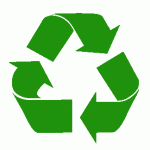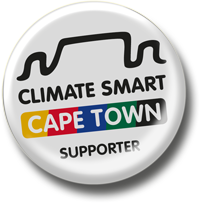Recycling facilities and services in Cape Town
 If you buy only what you need and avoid products with excessive packaging, that’s a good start. But our goal must be zero waste going into landfills, especially in Cape Town where land is precious and our biodiversity is unique. Not to mention that landfills put off loads of methane – a potent greenhouse gas.
If you buy only what you need and avoid products with excessive packaging, that’s a good start. But our goal must be zero waste going into landfills, especially in Cape Town where land is precious and our biodiversity is unique. Not to mention that landfills put off loads of methane – a potent greenhouse gas.
Separate your waste. Drop off recyclables yourself or pay a service to collect it for you. Start a worm farm. Compost if you have a garden. You can also donate used items and repair broken ones.
For mountains of practical advice on municipal and other recycling facilities and services read on …
City of Cape Town recycling drop-off sites
The City of Cape Town has 19 drop-off sites, two transfer stations (Athlone and Kraaifontein) and four landfill sites (Bellville South, Coastal Park and Vissershok) that accept various types of waste (full list defined in the downloadable pdf).
The drop-off sites are open in summer (1 September – 31 May) from 08h00 until 18h30 from Monday to Saturday. During winter the sites close at 17h00. The facilities are open on Sundays from 09h00 until 14h00 all year round (except Christmas Day and New Year’s Day).
For drop-off queries contact 021 4428136 or call the City of Cape Town call centre on 086 010 3089.
Download the City of Cape Town list of recycling drop-off sites (including types of waste accepted)
City of Cape Town “Think Twice” door-to-door household recycling
The City of Cape Town also operates five contracts, collectively known as the “Think Twice” contracts, where contractors collect mixed recyclables in clear bags from households in certain areas.
For more information visit: www.capetown.gov.za/en/solidwaste/Pages/ThinkTwice.aspx. You can also find out more from the contractor’s websites: www.wasteplan.co.za, www.wastecontrol.co.za and www.thinktwice.co.za.
Community and private sector recycling drop-off facilities
Download a list of schools and other sites (pages 3 and 4) at the end of this article.
Companies who collect recyclables from households and businesses
Download a list of companies (pages 5 – 7) at the end of this article.
Companies who buy back recyclables
Download a list of companies who will buy back recyclables (usually from businesses only). These are included on pages 8 and 9 on the document that can be downloaded below.
Engen petrol stations
Woolworths has a partnership with Engen to collect recyclable paper, plastic and glass. Find out more about the eight sites on page two of the downloadable document below.
Community and private sector recycling sites and services in Cape Town.
Please share your own recycling suggestions on our participate page or leave a reply below.









After reading about your Recycling facilities and services in Cape Town it made me think about recycling experience’s which I have been involved in or know something about. Below is a list which just come to mind.
Memories on recycling:
In the UK where I come from the local council issued free compost bins to the community; These were used to recycle all compostable household waste such as grass clippings; other garden waste and clippings; kitchen scraps; paper, etc.
They now issue each household with three recycling boxes one for glass; another for paper; and the last for plastic. I understand that the waste collection trucks have seperate sections for these to be emptied into.
During the 1970′s a local cardboard mill was converted to be powered by methane gas produced from a rubbish tip. This continued until the board mill was closed during the 1990′s.
During the development of a local community forest; a number of decommissioned waste tips and quarries were converted into wildlife reserves and intergrated into the community forest.
Trees were planted in certain areas as carbon traps near motorways. These trees are also used for carbon storage and micro business development. (NOTE: From observations; I would recommend very low density planting of trees for personal safety and fire concerns.)
Unsalvagable mini bus/taxi sized tyres were bolted together to form a tube sealed with heavy duty shrink wrap; and sold to local municipalities to be used as durable; recycled public waste bins.
Fast growing trees/carbon stores are harvested to make fencing; broom handles; woodchip mulch; sculptures, thatching spars, garden pea sticks; etc. (NOTE: woodchips and timber in the ground still retains most of the carbon locked up in it; but in a form which is easier for other plants to take up.)
Large compost heaps have been used to heat water for household use.
Bio digesters are used to convert pig; cattle, and chicken manure into methane gas for domestic; business, and transport use. The waste product makes a safe usable compost.
The concrete in decommissioned structures has been crushed to produce a hardcore type material for construction use.
Building demolition companies use recyclers to recycle old building materials; such as bricks, wood, doors, windows, roof tiles; etc.
During the Second World War; in the UK; London buses ran on wood gas due to fuel shortages. Now days due to high fuel costs some UK; fleet owners are converting to LPG or liquide methane to use as fuel.
Around the world many small and micro businesses exist through recycling. Governmental legilisation and commodity price flunctuations; are the deciding factors which dictate the success or demise of these businesses.
Recycling has many possibilities and prospects for job creation; so get thinking and see what you can come up with?